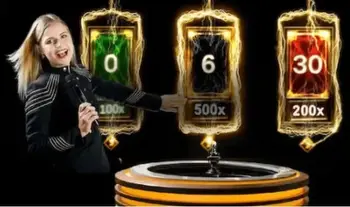Game Shows: Online games Give New Life to TV Screen Classics

Live Casino Adaptations are More Popular than any Game
Roulette, blackjack, poker, or slots - it’s always one of these games when the main character in a film enters a casino to play some chips or shoot some bullets. Yet, anyone who expects one of these four to be the most popular online casino gaming genres would have guessed wrong.
The answer is not even a game, as live casino adaptations of the classic TV game show format “have been making waves in the real-money gaming industry for the past few years” and have become more popular than “any other macro category of casino games”, states one of the latest studies by SevenJackpots revealing which casino games are the most popular in India.
The study, which was made using primary data from popular online casino Casino Days, shows that this popularity has allowed game shows to generate more than one third, or 34.48 percent, of the turnover sample analyzed by the research team, outperforming any other casino or card game in the catalog.
Roulette titles prove to be the second most important financial pillar for online casino operators, sampling a substantial 22.91 percent share of the turnover.
Blackjack (16.11 percent), baccarat (7.45 percent), and slots (4.59 percent) take the next three positions, followed by Sic Bo, Andar Bahar, variants of the poker game and other card and dice titles.
Notably, “top-ranked games are all live, possibly quick-play, and with a dynamic visual setup,” the researchers observe.
Where Did Game Shows Come From?
Game shows have been there since the creation of radio and television, and the fact that the programming line-up for the first day of commercial TV broadcast in the US - July 1, 1941, included an experimental episode of Ralph Edwards’ radio game show Truth or Consequences testifies to their entertainment potential.
During the second half of the 1950s, after a US Supreme Court ruling that they did not constitute illegal lotteries and were therefore a legitimate activity, TV game shows went through their first major boom featuring huge prize pools for the time reaching one lakh dollars.
The whole thing ended in scandals and a pile of broken careers when it was revealed that all famous game shows currently on air were staged and the results rigged.
Game shows however survived the integrity crisis and lived through many resurrections and transformations, and have now been embraced by the online casino industry and the game studios themselves.
Game Shows in the Digital World
In the decades before the mass penetration of the internet, it was only large TV studios and networks that could afford to produce game shows. Even low-budget day-time shows with modest prizes targeting housewives required studios, cameras, lights, and crews that were beyond the reach of regular businesses.
Digital technology turned the tables around not only by expanding the possibilities for communication and introducing social media, podcasts, apps and smartphones, but also by making video production accessible outside the doors of multi-million corporations.
“Chance-based TV games like “Wheel of Fortune” and “Deal or No Deal” are symbolic of the binary decisions or wagering-motivated behavior they require. Not surprisingly, these were some of the first game segments replicated for online casino platforms,” the researchers at SevenJackpots describe the underlying foundation of the match between the classic TV format and modern-day i-gaming.
“The revolutionary new genre kept features familiar and appreciated by most players – the real-time excitement of decision-making, the virtual representation of a social event, charismatic hosts, and easy-to-grasp game rules. Moreover, there has always been a reference to elements of skill, even if there is little or no knowledge involved,” the study points out.
The dynamic decision-making environment and the thrill for the contestants who have no one but themselves to rely on have also been compared with making stock investment decisions.
As a whole, under the roof of its TV hosts, the game show genre has been evolving towards more skill and knowledge-based formats like quizzes and team contests, while shows revolving around luck have moved over to the online scene.






































